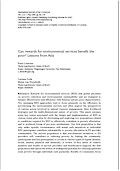| Journal Article |
 |
|
| Article Title | Can rewards for environmental services benefit the poor? Lessons from Asia | | Author | Beria Leimona, Laxman Joshi and Meine van Noordwijk | | Year | 2009 | | Journal Title | International Journal of the Commons | | Institution | Igitur, Utrecht Publishing & Archiving Services for IASC | | Volume | 3 | | Issue | 1 | | Pages | 82-107 | | Call Number | JA0350-09 | | Keywords | Asia, conservation, financial payment, non-financial payment, payments for environmental services, pro-poor, poverty | | Notes | URN:NBN:NL:UI:10-1-100052; ISSN:1875-0281 |
|
| Abstract: |
| Rewards for environmental services (RES) link global priorities on poverty reduction and environmental sustainability and are designed to balance effectiveness and efficiency with fairness and pro-poor characteristics. Yet, emerging RES approaches tend to focus primarily on the efficiency in provisioning the environmental services and often neglect the perspectives of various actors involved in natural resource management, their livelihood strategies and the multi-dimensional nature of poverty. This paper assesses some key issues associated with the design and implementation of RES in various Asian pilot sites by developing and exploring two propositions related
to conditions required for RES to effectively contribute to poverty alleviation, and to preferred forms of pro-poor mechanisms. Our first proposition is that only under specific circumstances will actual cash incentives to individual RES participants contribute substantially to poverty alleviation in ES provider communities. The second proposition is that non-financial incentives to ES providers will contribute to reducing poverty by linking the community (participants and non-participants) to access to various types of capital (human, social, natural, physical and financial). A review of key ratios of relative numbers and wealth of service providers and beneficiaries supports the first proposition and rejects the notion of widespread potential for reducing upstream rural poverty through individual cash payments. Results of community focus group discussions support the second proposition through context-specific preferences for mechanisms by which RES can help trigger conditions for sustainable development. |
|
|
Download file(s): Click icon to download/open file.
|
| |
File Size |
Description |

|
184 KB |
Softcopy |

|
- |
URL |
|
|
|
| Viewed in 2128 times. Downloaded in 1307 times. |